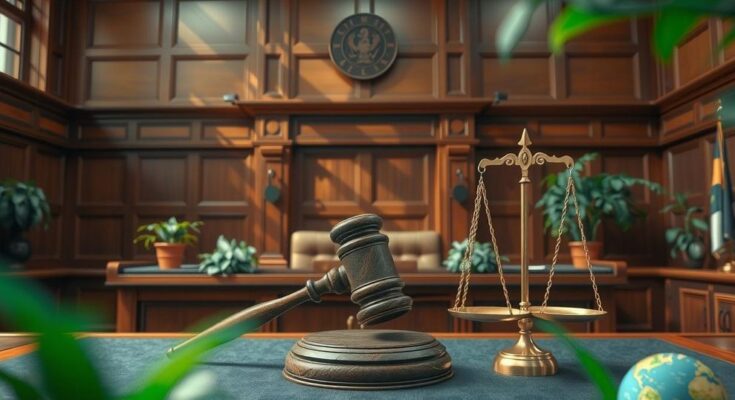The German court is hearing a pioneering case from Peruvian farmer Saul Luciano Lliuya against RWE for their carbon emissions contributing to glacier melting and flood risks. Lliuya seeks funding for flood defenses while the case could redefine corporate accountability in climate change. Legal analyses and expert reports are integral to the proceedings, with potential significant long-term implications.
A prominent German court resumed hearings on a case initiated by a Peruvian farmer, Saul Luciano Lliuya, who contends that emissions from German energy firm RWE have accelerated the melting of Andean glaciers, thereby elevating flood risks to his community. The outcome of this case could pave the way for future climate litigation by holding corporations responsible for past emissions that necessitate contributions towards climate adaptation efforts for impacted areas.
Lliuya, with support from the environmental group Germanwatch, is pursuing 21,000 euros (approximately $23,000) from RWE as part of a more extensive $3.5 million flood defense initiative. He has cited data indicating that RWE is responsible for nearly 0.5% of global man-made emissions since the onset of the industrial era, warranting a proportional financial obligation for climate change impacts.
Legal experts are observing the implications of this case closely, with Sebastien Duyck of the Center for International Environmental Law noting its potential to set significant legal precedents for corporate accountability. Debates regarding the financial responsibilities of industrialized nations in combating global warming effects have persisted through various U.N. climate summits, especially amid shifting economic priorities in developed countries.
Harjeet Singh of the Satat Sampada Climate Foundation emphasized that cases akin to Lliuya’s may eventually create alternative funding streams, providing financial resources for communities contending with severe climate-related impacts. Conversely, RWE has argued that attributing climate change effects to a single emitter is impractical, suggesting such accountability would extend to all individuals contributing to emissions.
The 2015 case began in Essen, Germany, and, although initially dismissed, was permitted to proceed in 2017. Currently, the court’s focus is on assessing whether rising water levels in Lake Palcacocha, exacerbated by glacier melt, pose a tangible risk to Lliuya’s residence in Huaraz. Expert evaluations regarding this risk were conducted in 2022, and their findings are expected to be reviewed during the current hearings.
Geotechnical expert Lukas Arenson raised concerns that analyses predominantly addressed ice avalanche impacts, neglecting the possible dangers posed by rock slides correlated with thawing permafrost. Should the court establish a direct flooding risk to Lliuya’s home, it will subsequently address the role of climate change in accelerating glacier melt, a process anticipated to extend the legal proceedings by an additional two years. Climate scientist Friederike Otto reinforced the connection between climate change and glacier retreat, asserting that substantial data support these claims.
Ultimately, Roda Verheyen, representing Lliuya in this matter, noted that the court’s acceptance of the case marks a significant achievement, transforming what began as a forlorn hope into an active legal endeavor. The broader implications of this landmark case could resonate within international climate policy discussions moving forward.
The ongoing case against RWE led by Saul Luciano Lliuya represents a significant moment in climate litigation, potentially reshaping the responsibilities of corporations regarding climate change. The court’s evaluations may establish a legal framework for future claims against corporate emissions. By highlighting the impacts of industrial pollution, this case aims to foster accountability for climate adaptation funding, an essential consideration in the fight against global warming effects.
Original Source: kfgo.com




